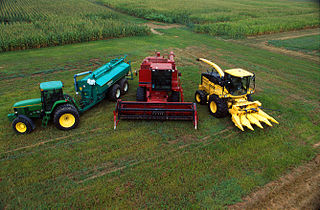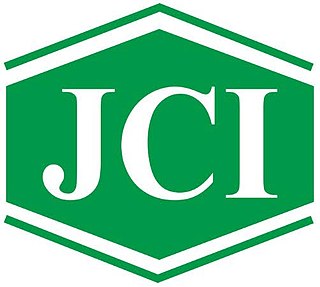Related Research Articles

Organic farming, also known as ecological farming or biological farming, is an agricultural system that uses fertilizers of organic origin such as compost manure, green manure, and bone meal and places emphasis on techniques such as crop rotation and companion planting. It originated early in the 20th century in reaction to rapidly changing farming practices. Certified organic agriculture accounts for 70 million hectares globally, with over half of that total in Australia. Biological pest control, mixed cropping, and the fostering of insect predators are encouraged. Organic standards are designed to allow the use of naturally-occurring substances while prohibiting or strictly limiting synthetic substances. For instance, naturally-occurring pesticides such as pyrethrin are permitted, while synthetic fertilizers and pesticides are generally prohibited. Synthetic substances that are allowed include, for example, copper sulfate, elemental sulfur, and veterinary drugs. Genetically modified organisms, nanomaterials, human sewage sludge, plant growth regulators, hormones, and antibiotic use in livestock husbandry are prohibited. Organic farming advocates claim advantages in sustainability, openness, self-sufficiency, autonomy and independence, health, food security, and food safety.

The Common Agricultural Policy (CAP) is the agricultural policy of the European Commission. It implements a system of agricultural subsidies and other programmes. It was introduced in 1962 and has since then undergone several changes to reduce the EEC budget cost and consider rural development in its aims. It has however, been criticised on the grounds of its cost, its environmental, and humanitarian effects.

An agricultural subsidy is a government incentive paid to agribusinesses, agricultural organizations and farms to supplement their income, manage the supply of agricultural commodities, and influence the cost and supply of such commodities.

Community-supported agriculture or cropsharing is a system that connects producers and consumers within the food system closer by allowing the consumer to subscribe to the harvest of a certain farm or group of farms. It is an alternative socioeconomic model of agriculture and food distribution that allows the producer and consumer to share the risks of farming. The model is a subcategory of civic agriculture that has an overarching goal of strengthening a sense of community through local markets.

Organic certification is a certification process for producers of organic food and other organic agricultural products. In general, any business directly involved in food production can be certified, including seed suppliers, farmers, food processors, retailers and restaurants. A lesser known counterpart is certification for organic textiles that includes certification of textile products made from organically grown fibres.

The Canadian Wheat Board was a marketing board for wheat and barley in Western Canada. Established by the Parliament of Canada on 5 July 1935, its operation was governed by the Canadian Wheat Board Act as a mandatory producer marketing system for wheat and barley in Alberta, Saskatchewan, Manitoba, and a small part of British Columbia. It was illegal for any farmer in areas under the CWB's jurisdiction to sell their wheat and barley through any other channel than the CWB. Although often called a monopoly, it was actually a monopsony since it was the only buyer of wheat and barley. It was a marketing agency acting on behalf of Western Canadian farmers, passing all profits from its operation back to farmers. Its market power over wheat and barley marketing was referred to as the "Single Desk".
British Columbia's Agricultural Land Reserve (ALR) is a collection of land where agriculture is designated as the priority use. Farming is encouraged and non-agricultural uses are restricted.

The Rainforest Alliance is an international non-governmental organization (NGO) with staff in more than 20 countries and operations in more than 70 countries. It was founded in 1987 by Daniel Katz, an American environmental activist, who serves as the chair of the board of directors. The NGO states that its mission is "to create a more sustainable world by using social and market forces to protect nature and improve the lives of farmers and forest communities." Its work includes the provision of an environmental certification for sustainability in agriculture. In parallel to its certification program, the Rainforest Alliance develops and implements long-term conservation and community development programs in a number of critically important tropical landscapes where commodity production threatens ecosystem health and the well-being of rural communities.

Agriculture in the United Kingdom uses 69% of the country's land area, employs 1% of its workforce and contributes 0.5% of its gross value added. The UK currently produces about 54% of its domestic food consumption.

Abhijit Sen was an Indian economist who focused on studying rural development. Sen was appointed to the Planning Commission of India between 2004 and 2014 and held a number of policy making positions in India. Amongst his works included recommendations toward establishment of minimum support price for farm produce and a universal public distribution system. Sen was a recipient of the Padma Bhushan, India's third highest civilian honor, in 2010.

Agriculture in India is highly susceptible to risks like droughts and floods. It is necessary to protect the farmers from natural calamities and ensure their credit eligibility for the next season. For this purpose, the Government of India introduced many agricultural social insurances throughout the country, the most important one of them being Pradhan Mantri Fasal Bima Yojana.
The National Commission on Farmers (NCF) is an Indian commission constituted on 18 November 2004 under the chairmanship of Professor M.S. Swaminathan to address the nationwide calamity of farmers suicides in India. The Terms of Reference reflected the priorities listed in the Common Minimum Programme. The NCF submitted four reports in December 2004, August 2005, December 2005 and April 2006 respectively. The fifth and final report was submitted on 4 October 2006. The reports contain suggestions to achieve the goal of "faster and more inclusive growth" as envisaged in the Approach to 11th Five Year Plan and are collectively termed the M.S. Swaminathan report for farmers

The Jute Corporation of India Limited (JCI) is central public sector undertaking under the ownership of Ministry of Textiles, Government of India. It is incorporated by the Government Of India in 1971 as a price support agency with a clear mandate for the procurement of raw jute / mesta without any quantitative limit from the growers at the minimum Support price (MSP) declared in each year by the Government Of India based on the recommendations made by Commission for Agricultural Cost & Prices (CACP). This protects the jute growers from exploitations in the hands of the middle men. The basic objective is not profit making but a social cause to protect the interest of about 4.00 million families engaged in farming of jute, most of whom are small / marginal farmers. Therefore, the presence of JCI in the market provide stability in the raw jute prices.
Contract farming involves agricultural production being carried out on the basis of an agreement between the buyer and farm producers. Sometimes it involves the buyer specifying the quality required and the price, with the farmer agreeing to deliver at a future date. More commonly, however, contracts outline conditions for the production of farm products and for their delivery to the buyer's premises. The farmer undertakes to supply agreed quantities of a crop or livestock product, based on the quality standards and delivery requirements of the purchaser. In return, the buyer, usually a company, agrees to buy the product, often at a price that is established in advance. The company often also agrees to support the farmer through, e.g., supplying inputs, assisting with land preparation, providing production advice and transporting produce to its premises. The term "outgrower scheme" is sometimes used synonymously with contract farming, most commonly in Eastern and Southern Africa. Contract farming can be used for many agricultural products, although in developing countries it is less common for staple crops such as rice and maize.

Ashok Gulati is an Indian agricultural economist and a former chairman of the Commission for Agricultural Costs and Prices (CACP), the advisory body of the Government of India on food supplies and pricing policies. Gulati was instrumental in the hiking the minimum support price of several food grains. Currently he is Infosys chair professor for Agriculture at Indian Council for Research on International Economic Relations (ICRIER). He is also a member of the Task Force on Agriculture set by the prime minister under NITI Aayog and chairman of the Expert Group on Agriculture Market Reforms (2015). He was an active member of the high-level committee set up by the NDA Government to restructure and reorient Food Corporation of India in order to improve its operational and financial efficiency.

The Scottish Land Commission was established by the Scottish Government following the passage of the Land Reform (Scotland) Act 2016 by the Scottish Parliament; the Commission also incorporates the work of the Tenant Farming Commissioner. The Lands Commissioners, who constitute the Commission, have functions relating to land in Scotland, so that they address issues which relate to ownership of land, land rights, management of land, and use of land. The Tenant Farming Commissioner has the aim of improving the relationship between tenant farmers and land owners, and can create codes of practice, provide practical guidance, and must consult on such matters. The Tenant Farming Commissioner cannot be an agricultural landlord or agricultural tenant, and will develop codes of practice which are in addition to the law and the jurisdiction of the Scottish Land Court.
The minimum support price (MSP) is the minimum price for select crops raised in kharif and rabi seasons that the Government of India considers as remunerative for farmers and hence deserves support. This is different from procurement price and issue price. It is generally announced before the sowing/planting season. It is approved by the government and aims to safeguard the farmer to a minimum profit for the harvest while at the same time increasing food security in the country. MSP was initially an incentive for farmers to adopt technology with an aim of increasing the productivity of agricultural land in the 1960s, however in the 2000s it is seen as a market intervention and farmer income scheme. The effectiveness of such a price policy has varied widely between states and commodities. Awareness among farmers of the existence of an MSP is poor at 23%, while awareness of MSP procurement agencies is also poor with only about 20–25% of wheat and paddy produce being sold at MSP.
The Bhavantar Bhugtan Yojana is a program of the Government of Madhya Pradesh in which the government compensates farmers for the difference between the official Minimum Support Price (MSP) and the rate at which they sell their crops, or the Model Price, whichever is higher.

The Indian agriculture acts of 2020, often termed the Farm Bills, were three acts initiated by the Parliament of India in September 2020. The Lok Sabha approved the bills on 17 September 2020 and the Rajya Sabha on 20 September 2020. The President of India, Ram Nath Kovind, gave his assent on 27 September 2020.
The 2024 Indian farmers' protest is the second round of continuous protests and road blockades initiated by farmers in the northern states of Punjab and Haryana on 13 February 2024. The primary requests of the protests include securing legal assurance for the Minimum Support Price (MSP) for all crops and complete forgiveness of loans for all farmers.
References
- ↑ "Current Chairman and Members".
- ↑ "The resolution passed for the creation of the commission".
- 1 2 "The Commission of Agricultural Costs & Prices Organisation". nic.in. Retrieved 18 August 2015.
- ↑ "Cane farmers association urges government to fix minimum support price for sugar". TET. Retrieved 18 August 2015.
- ↑ "Composition of CACP" . Retrieved 19 April 2019.